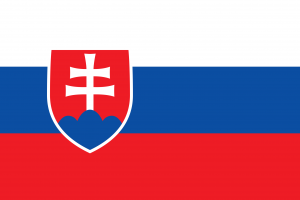Language/Slovak/Vocabulary/Nationalities-and-Languages
| ◀️ Introductions — Previous Lesson | Next Lesson — Nouns and Pronouns ▶️ |
Introduction[edit | edit source]
In this lesson, we will focus on learning vocabulary related to nationalities and languages in Slovak. This topic is essential for building a strong foundation in the Slovak language as it allows you to express your nationality and talk about different languages. By the end of this lesson, you will be able to confidently talk about nationalities and languages in Slovak.
To make the learning experience more engaging, we will explore cultural information and interesting facts related to nationalities and languages in Slovakia. This will help you understand the usage and importance of this vocabulary in real-life situations. We will also provide numerous examples to ensure a thorough understanding of the topic.
Let's dive into the fascinating world of nationalities and languages in Slovak!
Nationalities[edit | edit source]
In Slovak, nationalities are formed by adding the suffix "-ec" or "-ka" to the name of the country. It's important to note that the gender of the nationality will depend on the gender of the country's name. Let's explore some examples:
Masculine Nationalities[edit | edit source]
| Slovak | Pronunciation | English |
|---|---|---|
| Slovák | /ˈslovaːk/ | Slovak |
| Čech | /tʃɛx/ | Czech |
| Nemec | /ˈnɛmɛts/ | German |
| Poliak | /ˈpɔʎiak/ | Polish |
| Maďar | /ˈmaɟar/ | Hungarian |
Feminine Nationalities[edit | edit source]
| Slovak | Pronunciation | English |
|---|---|---|
| Slovenka | /ˈslɔvɛŋka/ | Slovak |
| Češka | /ˈtʃɛʃka/ | Czech |
| Nemka | /ˈnɛmka/ | German |
| Poľka | /ˈpɔʎka/ | Polish |
| Maďarka | /ˈmaɟarka/ | Hungarian |
Neuter Nationalities[edit | edit source]
Some nationalities in Slovak are formed using the neuter gender. Let's take a look at a few examples:
| Slovak | Pronunciation | English |
|---|---|---|
| Rus | /rus/ | Russian |
| Američan | /amɛritʃan/ | American |
| Angličan | /ˈaŋɡlitʃan/ | Englishman |
| Francúz | /ˈfrantʃuːs/ | Frenchman |
| Ital | /ˈital/ | Italian |
It's important to note that these are just a few examples, and there are many more nationalities in Slovak. As you continue learning the language, you will come across additional nationalities and their respective forms.
Languages[edit | edit source]
Now that we have explored nationalities, let's move on to learning vocabulary related to languages in Slovak. Talking about languages is crucial for expressing your linguistic abilities and understanding others' language preferences. Let's discover some common languages in Slovak:
| Slovak | Pronunciation | English |
|---|---|---|
| slovenčina | /ˈslovɛntʃina/ | Slovak |
| angličtina | /ˈaŋɡlitʃtina/ | English |
| nemčina | /ˈnɛmtʃina/ | German |
| poľština | /ˈpɔʎʃtina/ | Polish |
| maďarčina | /ˈmaɟartʃina/ | Hungarian |
These are just a few examples of languages in Slovak. As you progress in your language learning journey, you will come across more languages and their respective names in Slovak.
Cultural Insights[edit | edit source]
Slovakia is a multilingual country with a rich cultural heritage. The official language of Slovakia is Slovak, which is spoken by the majority of the population. However, due to its geographical location and historical influences, several other languages are spoken in the country. Hungarian, Czech, and Rusyn are recognized as minority languages in Slovakia.
The diversity of languages in Slovakia reflects the multicultural nature of the country. It also highlights the importance of language as a means of connecting with different communities and understanding their cultures. Learning about nationalities and languages in Slovak not only helps in effective communication but also fosters appreciation and respect for cultural diversity.
Slovakia is known for its strong emphasis on education and language learning. Slovak students typically learn multiple languages during their school years. English, German, and Russian are among the most commonly taught foreign languages in Slovak schools.
Practice Exercises[edit | edit source]
Now it's time to practice what you've learned! Complete the following exercises to reinforce your understanding of nationalities and languages in Slovak.
Exercise 1: Nationalities[edit | edit source]
Match the nationality with its corresponding gender and country.
- Slovák
- Češka
- Nemec
- Poľka
- Maďarka
Solution:
- Masculine - Slovák
- Feminine - Češka
- Masculine - Nemec
- Feminine - Poľka
- Feminine - Maďarka
Exercise 2: Languages[edit | edit source]
Translate the following languages from English to Slovak.
- English
- German
- Polish
- Hungarian
- Russian
Solution:
- angličtina
- nemčina
- poľština
- maďarčina
- ruština
Conclusion[edit | edit source]
Congratulations! You have successfully learned vocabulary related to nationalities and languages in Slovak. In this lesson, we explored the formation of nationalities in Slovak and practiced talking about different languages. We also gained insights into the cultural significance of language diversity in Slovakia.
Keep practicing the vocabulary and continue building your language skills. In the next lesson, we will delve into another exciting topic. Happy learning!
Sources[edit | edit source]
- Whoa! Learn 170+ Countries And Nationalities In Slovak - Ling App
- Czech vs Slovak - Difference and Comparison | Diffen
Other Lessons[edit | edit source]
- Numbers
- Directions
- Food
- Idiomatic Expressions
- Health
- Greetings
- How to say Good Bye?
- Holidays and Celebrations
- Election
- Days of the Week and Months of the Year
| ◀️ Introductions — Previous Lesson | Next Lesson — Nouns and Pronouns ▶️ |

